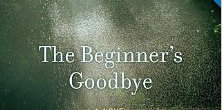Blogs
Tyler’s Latest

Tyler’s Latest
Book Review “The Beginner’s Goodbye” by Anne Tyler
If there’s one thing Anne Tyler does exceptionally well it’s to write with a “voice”.
“The strangest thing about my wife’s return from the dead,” the book begins, “was how other people reacted.”
Instantly we feel we know this person. The style is conversational, intimate. It’s as if he’s right here in the room chatting to us.
“We were strolling through Belvedere Square,” he continues, “When we met our old next-door neighbour.”
It’s this intimacy that gives us instant sympathy and rapport with our narrator.
It’s an unusual story, about coming to terms with the loss of a loved one. It could be maudlin but it isn’t. Shot through with humour and clever insights it manages to remain upbeat despite the subject matter.
What is strange is the period of time it purports to be set in. The main character is slightly disabled due to a childhood illness, which sounds like Polio, and I initially assumed from that, and from the descriptions of the houses and what people were wearing that it was set in the 1950’s or 60’s. But no, there are references to “cellphones” and computers.
Equally confusing was the age of the narrator. His whole attitude spoke of someone in their sixties and I was amazed to discover nearly three quarters of the way through the book that he is in fact only thirty-six!
Anne Tyler is the master of describing a lot in a very few words. This, for example, about the workmen doing up the narrator’s house:
“After we’d exchanged a few weather remarks I would leave for work, and by the time I returned they were already gone, no sign of them remaining, but their little nest of belongings on a scrunched-up drop cloth in one corner of the living room. Something hung on in the atmosphere, though-something more than the scent of their cigarette smoke. I felt I’d interrupted a conversation about richer, fuller lives than mine and when I drifted through the bare rooms it wasn’t only to reclaim my house; it was also, just a little bit, in the hope that some of the richness might have been left behind for me.”
Her insight into relationships is supreme: Here is a description of an argument that any couple will recognise:
“Why don’t you just begin at the beginning Aaron and tell me exactly what you envision for our anniversary dinner?”
“How about what you envision?” I said. “Can’t you be bothered coming up with ideas of your own?”
“I already offered an idea of my own, I offered two ideas as I recall, and you rejected both of them. So it’s back in your court now, Aaron.”
I forget where we ended up eating. Someplace or other; I don’t remember. What I do remember is the familiar, weary, helpless feeling, the feeling that we were confined in some kind of rodent cage, wrestling together doggedly, neither one of us winning.
Tyler gives the book a pat saccharine-sweet ending. But, in her defence, it’s hard to know where else she could take it, and whilst I can’t say I particularly enjoyed reading it at the time, it’s one of those books whose sentiments stay with you.
Bethany Askew is the author of eight novels: The Time Before, The World Within, Out of Step, Counting the Days, Poppy's Seed, Three Extraordinary Years The Two Saras and I Know You, Don't I? She has also written a short story, The Night of the Storm, and she writes poetry. Two more women’s fiction books have been accepted for publication in 2020 and 2021 respectively and she is currently working on a new novel. In her spare time she enjoys reading, music, theatre, walking, Pilates, dancing and voluntary work. Bethany is married and lives in Somerset.
Recent Comments
- Bethany Askew on About the Author
- Louise Tyrrell on About the Author
- Bethany Askew on About the Author
- Yola Munro on About the Author
- Andrea crosland on About the Author
-
Latest Posts
Meta
Bethany Askew
Bethany Askew is the author of eight novels:
The Time Before, The World Within, Out of Step, Counting the Days, Poppy’s Seed, Three Extraordinary Years,The Two Saras and I know you, Don’t I?
She has also written a short story, The Night of the Storm, and she writes poetry.
Two more women’s fiction books have been accepted for publication in 2020 and 2021 respectively and she is currently working on a new novel.
In her spare time she enjoys reading, music, theatre, walking, Pilates, dancing and voluntary work.
Bethany is married and lives in Somerset.
-
My Twitter Feed
-
Today from Bethany Askew Novelist : Book Review: The Woman in the White Kimono by Ana Johns https://t.co/2J6L2spX7t... 4 years ago
-
Copyright - Bethany Askew 2009 - 2016 Follow @AskewBethany
